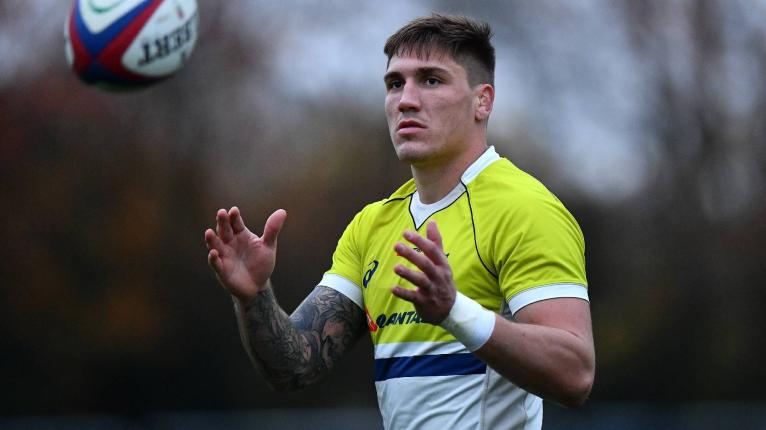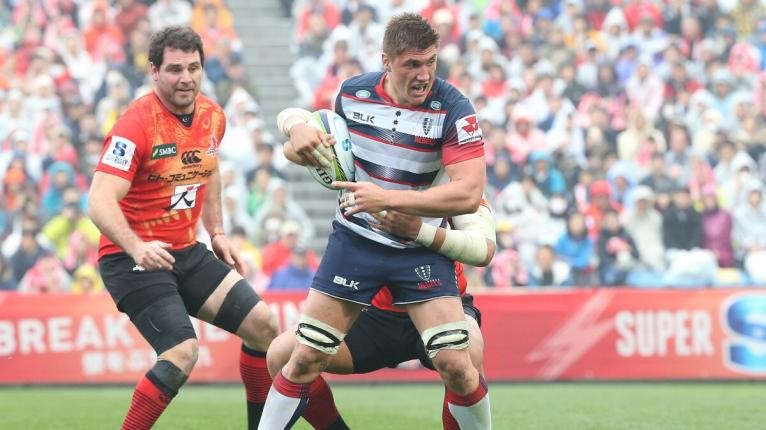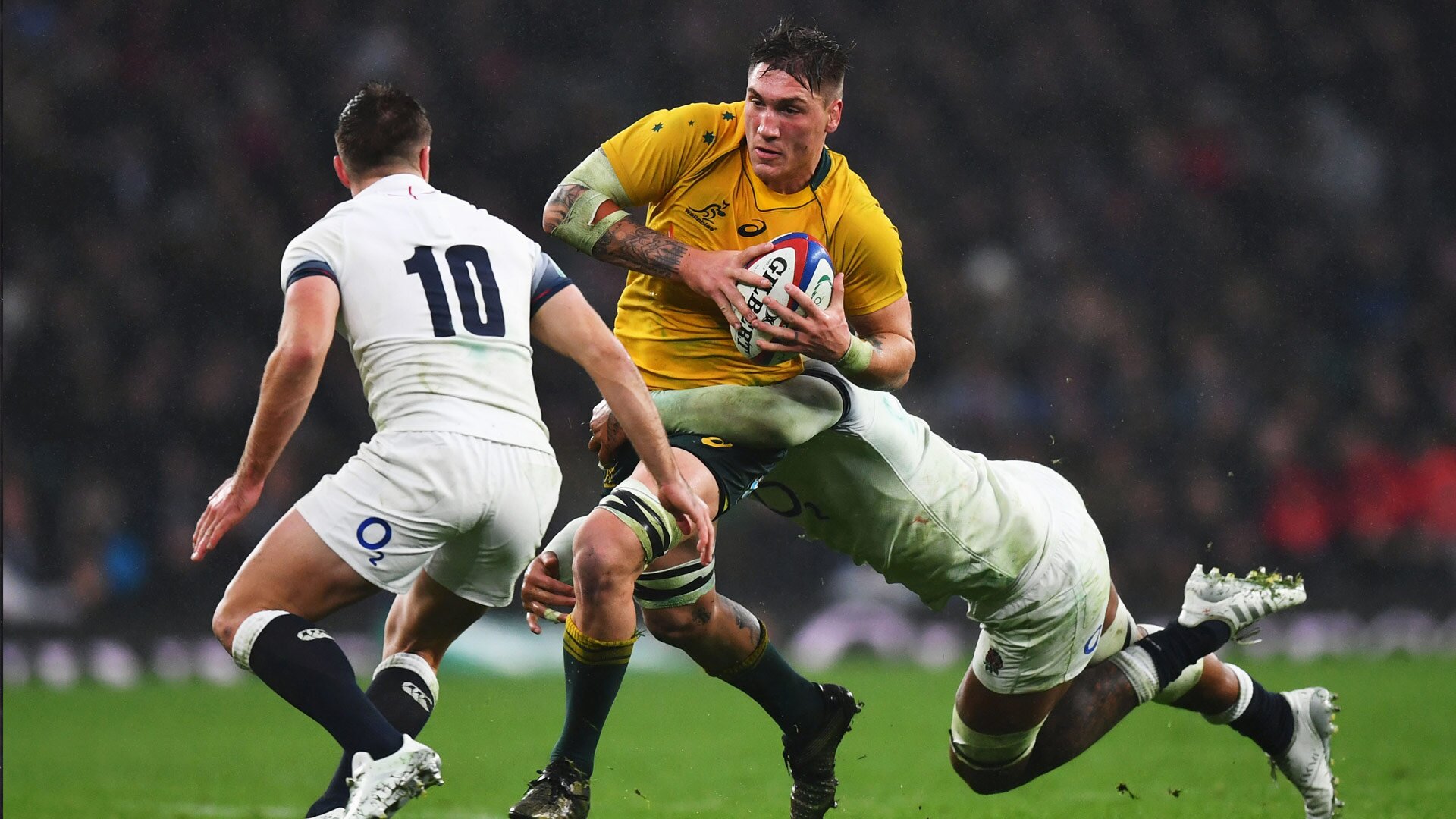'I wouldn't write it off': Ex-Wallabies star Sean McMahon reveals plans for World Cup, Super Rugby and Olympics

It has been little more than three years since Sean McMahon packed his bags and left Australia as he opened a new chapter in his career with Suntory Sungoliath.
Not long after playing in his 26th and last test for the Wallabies, a 53-24 defeat to Scotland in November 2017, the then-23-year-old departed for Tokyo, much to the dismay of fans across Australia.
That says a lot about the quality of the rugged loose forward, who, despite his age at the time of his jettison, was an integral figure in Michael Cheika’s set-up during his time with the Wallabies.
McMahon’s ability was also reflected in the accolades he had garnered at the time of his exit from Australian rugby.
After debuting for the Wallabies as a 20-year-old in 2014, he went on to claim Wallabies Rookie of the Year in 2015, Melbourne Rebels Player of the Year in both 2015 and 2016, and was Australia’s Super Rugby Player of the Year in 2016.
It was little surprise, then, to see him start in all but three of Australia’s 14 tests in his final season with the Wallabies, and it was equally as unsurprising to see fans Down Under disappointed at his decision to join the Top League juggernauts.
McMahon’s move to Japan wasn’t without reason, though, as the wear and tear of jumping through the ranks in rapid succession immediately out of high school quickly caught up with him.
“That first season, when I first came, when I first signed my year-and-a-bit contract, it was more to give my body a bit of a break,” McMahon told RugbyPass from Tokyo.
“Straight out of school, I played sevens, and then went straight into Super Rugby and then Wallabies, and I was probably fading a bit, but I loved the physicality of Super Rugby.
“I just went for a bit of a change and obviously kind of stayed on. I enjoy it over here.”

Having signed a contract extension that will keep him with the five-time Top League champions until March 2023 is indicative of how much McMahon is enjoying his spell in Japan, although the disruptions brought on by COVID-19 have proved difficult.
Last year’s edition of the competition was cancelled as a result of the pandemic, and this year’s campaign has already been delayed by three weeks following a virus breakout within the competition, which has impacted seven players at Suntory.
As a result, McMahon won’t be able to play his first competitive game in almost a year until next month at the earliest, but the strong foreign presence in Japan has made dealing with the mayhem easier.
“For us at Suntory, we live in the same building as the Canon Eagles, and I know Ed Quirk, who’s there, Bondy [Canon fullback Michael Bond], so get to catch up with those boys every now and then, and got a few boys throughout the other teams.
“I’ve got a real good mate, Liam Gill, he’s over at NTT Communications Shining Arcs, so there’s a few players throughout the competition. Now it’s going to depend on what the team’s policies become.”
That’s not even taking into account the large number of Australians and Kiwis at his own club, such as Samu Kerevi, Will Chambers, Jordan Smiler, Tevita Li and, of course, new star recruit Beauden Barrett.
“He’s been a big injection, obviously bringing a fair bit of experience with him to give to us and the team and Suntory in general,” McMahon said of the All Blacks playmaker and two-time World Rugby Player of the Year.
“We’ve had a couple of trial games with him, so he’s just finding his feet within the team and getting the job done. It’s been good to have him here.”
View this post on Instagram
McMahon said those trial games – which included wins over Toyota Verblitz, Toshiba Brave Lupus and the Panasonic Wild Knights, as well as a loss to the Canon Eagles – have helped lay the foundations for the season ahead.
That’s important for a side widely considered to be frontrunners for this year’s Top League championship, given the breadth of talent and offshore recruits evident throughout their squad.
However, since first arriving in Tokyo, McMahon has noticed a vast improvement from Japan’s homegrown players, which he believes stems from the success of the Brave Blossoms at the past two World Cups.
While Japanese rugby is renowned for its high-tempo, running-focused style of play, McMahon said it was the physicality from the local players that has helped both propel Japan to global prominence and grow the game domestically.
“They’re just wanting it more, the physicality,” he told RugbyPass.
“What they’re doing in the gym, what they’re bringing on the field, it’s definitely ramped up since I first got here, and they’re wanting to get better in that department and I think it’s showing for them internationally as well.
“I know for our team, a lot of Japanese players are excelling at it, which gives us an edge over a few other teams.”
As Japan continues to grow in leaps and bounds in the test arena and within their premier club competition, it begs the question as to how the country’s best clubs would fare if given a crack at Super Rugby.
Former Wallabies and Crusaders coach Robbie Deans recently spoke about how he believes the top six teams from the Top League would be competitive in the southern hemisphere tournament, of which is undergoing significant reform due to COVID-19.
Although Japan’s only involvement in Super Rugby came via the Sunwolves, the loveably woeful franchise that stumbled to nine wins from 68 matches, McMahon said there is still plenty of potential for Japanese inclusion in any future iteration of Super Rugby.
“If they could make it work, it’d be unreal,” McMahon, who was due to play for the Sunwolves in 2019 before a foot injury ruled him out for the season, said.
“I’ve been here a few years now, and to have a Japanese team, or even if you could figure out how to get a couple of the club sides to battle it out here and then maybe they jump in that season or work to some kind of platform like that, I think it’d be great, not just for Japanese rugby, but for Super Rugby as well.
“I know the Sunwolves had a couple of rough seasons, but I think it’s a shame to not have the Japanese part of that Super Rugby, especially with the amount of devotion the fans are getting here for rugby as well.”
Regardless of whether Japan will be welcomed back into the Super Rugby fraternity, McMahon is eager to see how the new-look competition, featuring only New Zealand and Australian franchises this year, will pan out.
“Obviously New Zealand’s had the teams to beat in Super Rugby for a long time, so it’s going to be very interesting to see how we match up with each other over just a Trans-Tasman competition, and with a little less travel in regards to having to go over to South Africa.”

McMahon added that travelling to Africa was a highlight of the old Super Rugby format that will be missed, but he is optimistic of what the new competition holds.
“Don’t get me wrong, I’ve missed the ol’ heading over to South Africa for a couple of weeks, as pretty much every player in Super Rugby will. That used to be a good tour over there with the boys, on and off the field.
“But, I think it’s going to be interesting to see what happens with that Trans-Tasman competition, because there’s a lot of talent throughout Australia and New Zealand to see how we match up with each other after kind of getting our footing together with the AU and Aotearoa competitions.”
You’d be forgiven for thinking that McMahon will take extra note of how his former side, the Rebels, will perform in both the Super Rugby AU and Super Rugby Trans-Tasman competitions this year.
However, as he pointed out, most of those he played alongside during his four-season stint in Melbourne have since departed, largely thanks to the influx of Western Force players following their axing from Super Rugby in 2017.
In fact, only three players – Marika Koroibete, Reece Hodge and Jordan Uelese – have been remained at AAMI Park since McMahon’s defection, but that doesn’t mean he has ruled out a return to Victoria.
“I wouldn’t write it off the books,” McMahon said.
“I love Melbourne as a place to live, and the team and the Rebels and the people that were there, but it’d be all about what fits well for my family and myself if I were to go back and how things would work and set-up.”
That will be music to the ears of Wallabies fans, who have endured three fruitless seasons without their star loose forward, but will have to wait a further two years before he comes off contract with Suntory.
McMahon has made it crystal clear, however, that he still harbours a desire to don the green and gold jersey once again.
“I would love to go back to Australia and have another crack there. I’ve always wanted to put the gold jersey back on and have another crack, so it’s definitely not off the books for me.
“I would definitely be keen to get back down and have a crack one more time to see if I can still crack it back there, see if I’ve still got what it takes to be at the highest level.
“It’s definitely something I see myself doing, and if that’s a chance to potentially go back before the World Cup and have a crack, I’d definitely keep that on the books for me, for sure.”

A second World Cup appearance isn’t the only thing that McMahon has expressed an interest in in recent years, with the 26-year-old making himself available for the Australian sevens side leading into the 2020 Tokyo Olympics.
That led to his first outing for the national sevens team in five years when he took to the field at the 2019 Cape Town Sevens.
But, with COVID-19 postponing the Olympics until July and August this year, McMahon remains uncertain about his future in the abbreviated format of the game.
“I haven’t had a lot of thought about that at present. I think anyone would still be keen to have a crack at the Olympics. It’s a pretty big feat to have that opportunity,” he said.
“I’ve been to a Commonwealth Games, and I guess to tick a box of going to the Olympics, that’s something you get to have for the rest of your life, that memory if you do get to go.
“I would love to go, but my focus right now is trying to get through this current stage of Top League and get back into playing some genuine footy, because we’ve only played a couple of trials and there’s been so many months of just training.
“At this point in time, I’d just rather play footy than think about what’s going on ahead.”
Should he decide to pursue an Olympic gold medal, he could be joined by one of his good mates in the form of ex-Wallabies flanker and former sevens veteran Liam Gill.
“I’ve chatted to him every now and again and he’s said he’d be keen to have a crack if he could still get around on the sevens field.”
Until then, though, mounting a challenge for the Top League crown remains paramount for McMahon, who is intent on adding to the title he won in his first season with Suntory Sungoliath three years ago.
“We’ve put a lot of effort into this pre-season, and as much as the competition has been suspended for a couple of weeks now, I think my main priority with a lot of the boys here is another championship and fighting our way for that.
“That’s kind of the number one priority for me at this point in time.”











































































